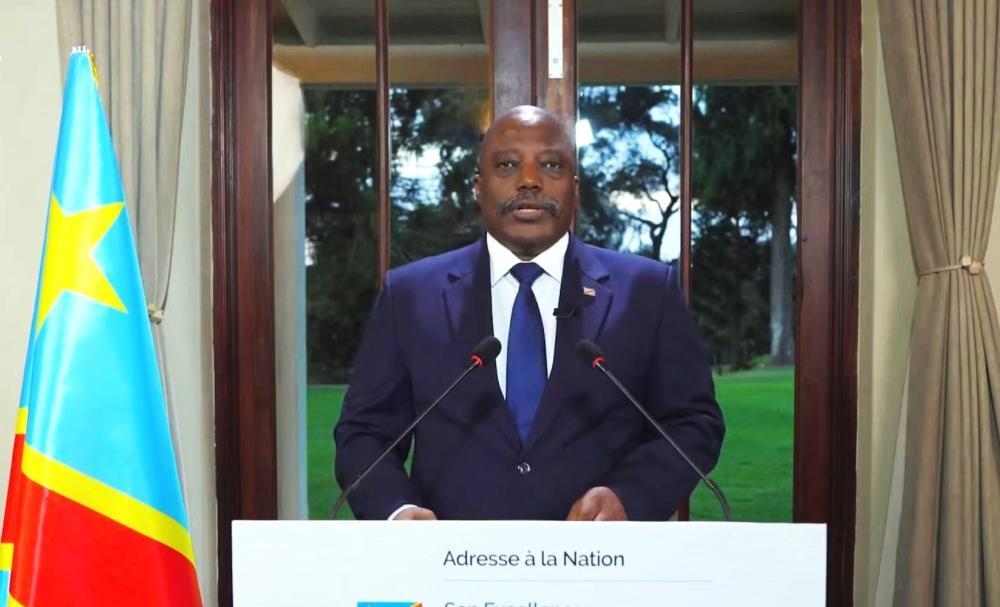Africa-Press – Rwanda. The AFC/M23 rebels who control the eastern DR Congo main city of Goma confirmed the return of former President Joseph Kabila on Monday, May 26, ending six years of his self-imposed exile.
Kabila, who faces treason charges in his country over alleged links to the rebels, returned to Goma, the capital of North Kivu province, after he arrived in the city briefly in April before returning to Southern Africa.
“The return home of this great political figure is welcomed,” AFC/M23 political leader Corneille Nangaa said in a post on X on Monday morning. “He made the right choice, rather than remaining in forced exile.”
His return to Goma comes barely two days after he accused President Felix Tshisekedi’s government for populism, lies, arrogance, institutionalisation of tribalism and nepotism, and impunity, among other ills, that destroyed national cohesion as well as rendered the country fragile and vulnerable. Kabila, 53, ruled DR Congo between from 2001 to January 2019, when he was succeeded by the incumbent, Tshisekedi.
The two fell out later, with Kabila accusing Tshisekedi of violating an agreement that brought him to power. Tshisekedi has accused Kabila of backing the AFC/M23 rebels.
The Congolese Senate on May 22, voted in favour of a resolution lifting the immunity of Kabila, who is a senator for life, authorizing legal proceedings against him.
The military high court has mounted treason and war crimes charges against Kabila, whose assets have also been seized. His supporters say the criminal charges are part of a “witch hunt.”
Speaking from an undisclosed location on Friday, after he was stripped of immunity, Kabila called Tshisekedi a “demagogue,” and accused him of “discrimination and stigmatisation of certain sections of our people, the institutionalisation of tribalism and nepotism.”
The former president, who ended his silence on the conflict in February this year, has previously accused Tshisekedi of mismanaging the crisis in eastern DR Congo and dismissed the latter’s attempts to blame external actors for it.
His return to Goma city could mark a new chapter in the conflict between Tshisekedi and the rebels, who have controlled swathes of territory, including Bukavu, the capital of South Kivu province, since early 2025.
This also happens as opposition parties, including Kabila’s People’s Party for Reconstruction and Democracy (PPRD), accuse Tshisekedi of stifling them.
“In Goma, [Joseph Kabila] is welcome, in the only part of the country where arbitrariness, political persecution, death sentences, tribalism, discrimination, hate speech… do not exist,” said Nangaa, who was the head of the Congolese electoral commission (CENI) during Kabila’s late years as president.
“Since last February, several delegations and personalities from all walks of life have passed through Goma. They were able to see the work done by the Alliance Fleuve Congo (AFC/M23) to restore the security of people and their property.”
The M23 rebels, who have been fighting since late 2021, took control of Goma in January this year. They took control of Bukavu in February.
The rebels seized Goma for days in 2012, before they withdrew and went into exile. Now part of a bigger alliance founded in December 2023, that has gained significant support from Congolese politicians, the rebels have held more territory and for longer.
In April, thanks to mediation by Qatar, the rebels and the Congolese government held their first direct talks since 2021. The two parties announced their commitment to a ceasefire on April 23, but the Doha talks have yet to reach an agreement.
US President Donald Trump’s Senior Advisor for Africa, Massad Boulos, on May 15, held discussions with President Paul Kagame and Congolese President Félix Tshisekedi on the developments of a proposed peace agreement expected to be signed in June. The anticipated peace agreement seeks to resolve the ongoing conflict in eastern DR Congo, with emphasis on addressing the root causes of the decades-long insecurity crisis, including the presence in DR Congo of the Kinshasa-backed FDLR, a group founded by remnants of perpetrators of the 1994 Genocide against the Tutsi.
Speaking at a news conference on Sunday, in Goma, Bertrand Bisiimwa, the deputy to Nangaa, said they were no longer making any demands from the Kinshasa government.
“We have left the stage of demands; we are currently a liberation movement,” said Bisiimwa.
“This means that we do not have a list of demands to present to Kinshasa, but we have problems that exist and that we must resolve with Kinshasa or without Kinshasa.”
For More News And Analysis About Rwanda Follow Africa-Press






